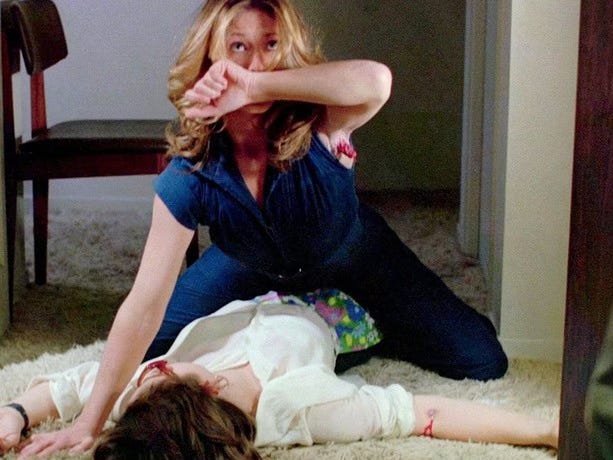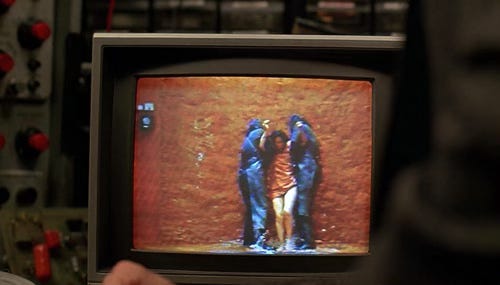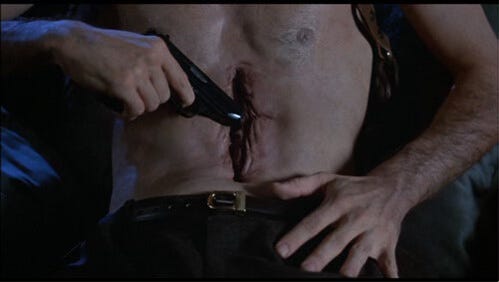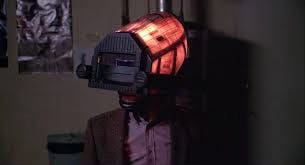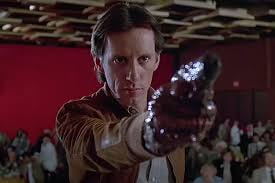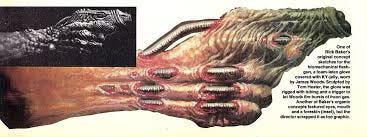My wife and I have been watching Cronenberg’s films.
While I haven’t seen all his earlier work, Rabid was his earliest, followed by Scanners and every feature up to Crimes of the Future (2023).
That movie is an excellent place to end, as it creates a loop that brings us back to Cronenberg’s early work.
Cronenberg is an agent of chaos and a provocateur who creates film narratives through explorations of violence and sex and their intertwining. He plays with form and function.
He doesn’t work with huge budgets. Most of his career has been bootstrapping films on a shoestring.
Overall, I’ve enjoyed watching his films. They have a strong ‘outsider’ theme—of people living on the fringe, often on the brink of insanity, frequently finding themselves at odds with secret societies or the larger culture.
As a horror writer myself, Cronenberg’s body horror has been influential, and his outsider status is enticing.
I’ll be looking at Cronenberg’s films by examining his movies and discussing his choice of leading men.
Why? I believe that his leading men are weirdos and misfits—who are cast to make the films stranger. They are wide-eyed, hollowed-cheeked oddballs—and for some reason, when I was thinking about what to write about, they leapt out at me.
I’ll start with 1977’s Rabid. Strangely, his earliest film (that I’ve watched) has a female lead. At least, that is how it seems; there is a dual-protagonist scenario, but we spend most of our time with Marilyn Chambers’ Rose.
After having been in a motorcycle accident, Rose receives a skin graft from a plastic surgeon that turns her into a blood-craving maniac with an armpit alien.
Sound weird? It is. It doesn’t make sense, but it doesn’t matter.
This is the most Canadian of his movies I have viewed. That ‘70s mid-Canadian accent shows up in ways I never expected. Anyway, I’m getting off-topic.
Strangely, Rose’s armpit alien, a tiny little pink appendage that oozes out of a wound/slit, infects everyone that it bites, making them ‘rabid.’
This movie has vampire and zombie tones. Rose is a hybrid of the ideas. She hungers for blood and infects whomever she bites. The infected are more mindless than she is.
Anywho, they lock down Montreal—and the W.H.O. declares a pandemic.
Sound familiar? Yeah, this movie has a lockdown scene and everything. Cronenberg even predicted lockdown IDs that showed you weren’t infected.
I’m just glad that the Canadian military and police weren’t called out to stand on the corners and shoot everyone with Covid like they mowed down the ‘rabid’ in this movie.
They’re a bit trigger-happy, have machine guns, and plug thousands of bullets into whomever they suspect is infected.
Honestly, this movie is enjoyable, but it isn’t good.
Rabid mixes David’s body horror trappings with erotic undertones that crop up in his later films.
Marilyn Chambers does a proper job of being the confused and seductive protagonist, smooching her way into bloody entangles wherever she goes.
Thematically, I wonder what Cronenberg was saying here—whether it was conscious or unconscious; there is a theme about women being dangerous by spreading disease with their sexuality. It seems inherently misogynistic, and it might be. It was the ‘70s, coming out of the ‘sexual revolution’ of the ‘60s.
That said, I don’t know if Cronenberg is passing judgment on women or is fascinated with the idea of how the government uses STIs and the fear of them as a method of control.
Probably both. Possibly neither.
The movie ends when Rose is murdered by one of the 'rabid’ and, in perfect Cronenberg fashion, has her corpse thrown into a dump truck and compacted as the credits roll.
This establishes a precedent for many of Cronenberg’s protagonists. Generally, it doesn’t end well for them.
This brings us to Scanners, the story of Cameron Vale (Stephen Lack), a down-on-his-luck guy who manifests psychic powers.
A military company, Consec, discovers this and recruits him into their organization.
Here, Cameron discovers he is one of two hundred ‘Scanners’—people with psychic abilities. Cansec supplies him with drugs to control his powers while teaching him to use them.
However, there is a splinter cell of Scanners, led by Darryl Revok (Michael Ironside), who has been driven mad by his abilities. Revok plans to kill the Scanners working with ConSec.
In one of Cronenberg’s most watched moments, Revok explodes a doctor’s head with his mind.
Secret organizations, paranoia, and a second-act twist revealing Cameron and Darryl as brothers. They’re also the sons of the doctor in charge of Consec. Holy, Empire Strikes Back.
What a bloody life for Cameron and his brother! They’re all fucked up about the revelations, so they must battle with their minds! Cameron thinks so hard that he lights himself on fire, and in doing so, he fucks his brother up.
I’m telling you, the vein that pops out of his brother’s head is massive!
Cut to—Cameron’s charbroiled body.
Cameron managed to move his consciousness into his brother Daryl’s body with his mind powers. He isn’t dead, but now he has to live as his brother.
Hot damn, this is a great movie.
It’s kind of like Harry Potter, but instead of discovering you’re a wizard, you find out that your dad genetically tampered with you at birth, and you can explode people with your mind.
Stephen Lack’s acting resembles Mark Hamill’s in The Empire Strikes Back. He has those baby blues that draw you in—they’re pretty eery—and a calm presence that denotes the power of his drug-enhanced brain.
Stephen seems innocent, the perfect psychic superhero, but he gets his hands dirty and is hardly unscathed by the movie’s end.
His journey isn’t deeply intellectual—all his struggles are external—but with all the fucked up visuals, I hardly cared.
Cronenberg considers how medical intervention can be used in the evolution of homo sapiens. Yet, instead of becoming genetically superior—we evolve terribly.
Are we so profoundly flawed? Cronenberg seems to think that humanity can’t engineer genetic perfection, a theme we will see repeated in The Fly and Crimes of the Future.
His next movie is one of my favourites: Videodrome, starring James Woods.
This is a dark, strange film about a television executive, Max Renn (Woods), who discovers that ‘snuff’ movies dubbed ‘Videodrome’ are being broadcast onto UHF channels.
Instead of being horrified by them, he becomes entranced and tries to track down their broadcaster, believing they are fake. He hopes to create similar videos for his network.
In an interview, Renn, who broadcasts soft porn and violent movies, states that he is giving his audience a ‘harmless’ outlet for their fantasies and frustrations, calling it a ‘socially positive act.’
Later in the same interview, the interviewee asks a man named Professor O.blivion: do you think that erotic and violent TV leads to desensitization and dehumanization?
We’re still having this debate that violence in media leads to aggression, bullying and fighting and that pornography leads to failed marriages and partnerships.
I’m not so sure Cronenberg gives a shit about these arguments. He’s a provocateur; he isn’t out to answer these arguments; he’s here to add fuel to that fire. Fuck your morality, let’s light it on fire and dance in the flames.
So, Renn discovers that the Videodrome broadcast might cause brain tumours in those watching.
Then, it is posited that Videodrome makes them grow new organs.
Cronenberg starts fucking with his audience—making Renn, and his audience, begin to question the reality of what Renn, and they, are seeing.
Is this a tumour-based hallucination in Renn’s mind? Has his reality shifted because of the new organs Videodrome has grown in his head?
It makes Renn do strange shit.
He makes out with it a television.
He places a gun into a ‘flesh’ cavity in his abdomen.
Everything goes off the rails here. The movie churns, introducing many possibilities of what is happening while simultaneously making you question Renn’s sanity. I’ll summarize the film as quickly as possible, knowing it probably won’t make much sense.
Renn suspects O.Blivion is Videodrome—no, he died from a brain tumour because of it.
The real villain is Convex, a man working for a corporation that makes glasses, missile guidance systems—and videos. Convex puts a machine on Renn’s head to ‘record’ his hallucinations.
Renn passes out and wakes up in bed with a dead body.
Convex sticks a Videodrome tape into Renn’s stomach, who goes crazy and uses his abdomen gun to shoot the partners of his deranged television station.
He tries O.Blivion’s daughter, but she reprograms him with another tape inserted into his abdomen.
His hand turns into a gun. He uses the ‘handgun’ to shoot Convex.
It’s confusing—but purposely so; we’re on a trip in the psyche of a madman with brain tumour hallucinations, after all.
That’s a lot to take in. It hurts my brain to write (and edit) the words I have just written. The confusion and jumble of ideas help propel the plot—if you’re willing to enjoy the ride. Cronenberg doesn’t seem overly concerned whether you can follow what he’s putting down. He’s maniacally adding elements to the story, revelling in the madness of it all.
The mood that Cronenberg transmits (creates) with the muddled ideas makes this movie great. It’s sexual but not sexy. It’s violent, but in ways I’ve never seen before (video tape insertion and meatguns).
Watching Videodrome has a voyeuristic quality. You’re unsure what you’re watching but can’t wait to see what happens next.
It is fucking the new weird happening on film. This started a new kind of horror fiction that has been copped, morphed, distorted, and plagiarized for decades.
I imagine Cronenbery is ecstatic that his ideas have been dissected. Given their subject matter, it seems apt.
Videodrome takes the idea of Scanners and amps up the head-exploding scene into multiple scenes. It takes the evil corporation to new heights by destroying the protagonist’s credibility.
This goes against all storytelling conventions. The protagonist isn’t making decisions; malevolent forces are dragging him along.
And I love it for that. I love a story where someone’s sanity is broken into a thousand pieces and thrown into Mixmaster on Puree setting. This is one of those.
Woods is masterful as a sleezebag. I don’t think he’s likeable. He’s gross—a man who is turned on by disgusting snuff films, someone responsible for sleazy television—but he's fucking amazing at it. He’s human in a way a lot of protagonists strive to be—dirty, emotional, slutty.
He’s the first star in a Cronenberg movie—he wanted to work on this movie and, supposedly, chased it. Looking at his IDMB, it may have been the strangest role he ever took. It isn’t a hero role—he is entirely antihero.
He shoots himself with his meatgunhand to transition to the ‘new flesh.’
Does he transition into a new, better body? Or does he blow his brains out?
I like to imagine that there is a sequel in which he finds himself in some strange new universe where flesh is entirely mouldable, leading to some genuinely disgusting new ideas.
Oh, and shout out to Debbie Harry (Blondie), who plays the romantic interest, a psychotic hallucination, a sexually deviant television host, and more. Without her incredible performance, this movie would be a big, flaccid nothing.
Tune in for Part 2, where we discuss The Dead Zone and more.
Hope you’re well,
Enjoy the spooky season.
Martin J.




